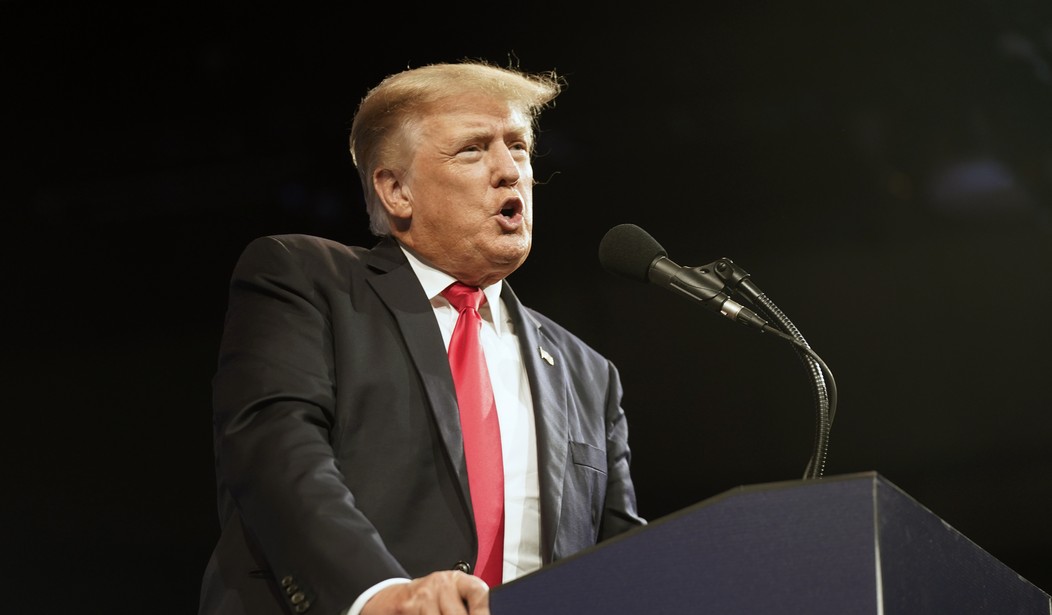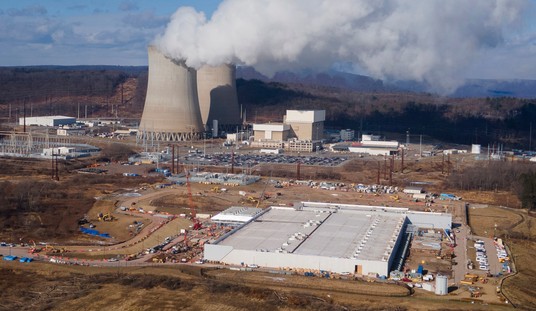Asked about the vaccine by Maria Bartiromo on March 16, he said, “I would recommend it and I would recommend it to a lot of people that don’t want to get it and a lot of those people voted for me, frankly… It is a great vaccine. It is a safe vaccine and it is something that works.”
Does he still feel that way?
I don’t mean to imply that he’s anti-vax. He’s been vaccinated himself. What I mean is, as headlines proliferate about low vaccination rates in red counties and the partisan tribal lines around the issue harden, he may be shifting towards what we might call a more base-pleasing anti-anti-anti-vax position. He’s not against the vaccine but he’s against the people who are promoting the vaccine. Which is destined to convince some of his fans to feel skeptical about what those people are promoting.
Linking the vaccine to election conspiracy theories in particular is going to supercharge vaccine skepticism as a new populist litmus test. As a Twitter pal put it, “Trump is making explicit that refusing the vaccine is an emblem of resistance to the Biden Administration, and a way to show how mad you are about the 2020 election.” How can you be a member of MAGA Nation in good standing if you’re willing to take Joe Biden at his word that the vaccines are safe and effective?
You don’t take him at his word when he says he won fair and square, do you?

Not anti-vax. He’s not saying the vaccines don’t work. But he is saying that you can’t blame anyone who chooses not to get vaccinated because Biden, the lead spokesman for the national effort, allegedly has no credibility. Anti-anti-anti-vax.
Political Twitter spent much of this past weekend brawling over whether the remaining unvaccinated are persuadable and to what extent partisanship can be blamed for their hesitancy. The pandemic is becoming a two-tiered phenomenon in which less vaccinated communities are experiencing a COVID epidemic while more vaccinated communities are experiencing something more like a flu epidemic, and the mainstream media has taken note that those less vaccinated communities tend to trend Republican. Righty media has understandably reacted by getting more defensive about the insinuation that, to the extent the pandemic in the U.S. drags on, it’s entirely their fault. It isn’t, as Jazz rightly noted this morning. Black and Latino communities are still playing catch-up with more affluent white communities on getting immunized. They’re going to keep the pandemic going locally too until more get jabbed.
But there’s no doubt that there’s a partisan gap on vaccinations. We can slice and dice that data in different ways but here’s probably the single most arresting image of the phenomenon:
Vaccination rate correlates with POTUS vote down to the county level. Hard to see this and assume politics and media diets have nothing to do with vaccine decisions.
Turning Fauci into a caricatured villain, wanting Biden to fail, Fox blaring conspiracy theories: all factors.
6/x pic.twitter.com/yKMPYCXERd— Nicholas Grossman (@NGrossman81) July 18, 2021
There’s also a difference between vaccine hesitancy and vaccine resistance. Both of the hesitant and the resistant are unvaccinated for the moment but one is more persuadable than the other. The hesitant aren’t holding out for ideological reasons, they’re just wary of the shots and want more information. The Kaiser Family Foundation polled different demographic groups about that last month:

Democrats are the group most likely to say they’ve received at least one dose already while Republicans are among the least likely. Black adults are trailing far behind Democrats in general, but there are more of them who say they’ve gotten one dose or plan to get vaccinated ASAP (65 percent) than Republicans who say so (54 percent). And there are more blacks in the vaccine-hesitant “wait and see” group (15 percent) than Republicans (12 percent), suggesting there are more persuadables left in their demographic. Which is important, since Democratic politicians and lefty media are all but unanimous in urging their constituents to get vaccinated while Republicans and righty media … are not.
Which may explain why no group in the Kaiser poll has a higher share of vaccine-resistant members than Republicans. Combined, the percentage who say they’ll either refuse to get a shot or will get one only if required is 31 percent, nearly a third of the party. Among blacks, just 17 percent say the same.
CBS News published its own poll yesterday confirming that Republicans are more vaccine-resistant:

Three percent of Biden voters say they’ve ruled out getting vaccinated versus 32 percent of Trump voters. Just 17 percent of blacks have ruled it out. This is why racial comparisons noting that whites have gotten vaccinated at higher rates than blacks don’t tell the full story. It’s true, but the reason is because white Democrats are so uniformly vaccinated that they’re managing to lift the average for whites overall despite the lowish rates among white Republicans.
One other point made over the weekend was that top Democrats had their own stretch of vaccine-skeptical rhetoric last fall, most famously when Kamala Harris said she wouldn’t take a vaccine purely on Trump’s recommendation. (She said in the same interview that she would take it if Fauci recommended it.) That’s true, and Harris deserved the heat she got for it. But the context missing from those tu-quoques was that Trump had been hinting in various ways before and after Harris spoke that he wanted the vaccine authorized before Election Day, the ultimate October surprise to boost his polls. And if that had happened, vaccine skepticism would have been justified. The process would have reeked of the president having forced approval of a drug that may not have been thoroughly tested yet because he thought he’d benefit from it politically. One of Trump’s most famous tweets came in late August of 2020, a few weeks before Harris said she wouldn’t trust him:
“The deep state, or whoever, over at the FDA is making it very difficult for drug companies to get people in order to test the vaccines and therapeutics,” he said on Twitter. “Obviously, they are hoping to delay the answer until after November 3rd. Must focus on speed, and saving lives!” He tagged FDA Commissioner Stephen Hahn in the tweet.
November 3rd was Election Day. Demagoging the FDA as the “deep state” was his way of pressuring them to authorize the vaccine before that date, obviously so that he could take credit. Earlier that month, weeks before he sent that tweet, the NYT published a story about people inside and outside the government worrying that Trump would try to ram through vaccine approval prematurely before the election in hopes that doing so would boost him to victory. “While White House officials do not specifically mention the election during the board’s discussions, people familiar with the conversations say they ask regularly about October, a date that hangs over the effort,” the Times wrote. “Trump campaign advisers privately call a pre-election vaccine ‘the holy grail.'”
In early October, the FDA issued new guidelines for testing the vaccine that required manufacturers to follow test subjects for two months to make sure no late-developing side effects occurred. That timeline all but guaranteed that authorization wouldn’t come until after the election. The White House initially blocked those guidelines even though they were designed to encourage public confidence in the integrity of the testing process. Why’d they block them? Because the new timeline meant there’d be no October surprise for Trump after all, a nakedly political decision. When the FDA revealed the week after the election that Pfizer’s vaccine (which wasn’t part of Operation Warp Speed) was more than 90 percent effective, Trump started ranting about a “medical deep state” out to get him.
So, yeah, it wasn’t good for Kamala Harris to have talked down the vaccines in early September because she didn’t trust Trump. But Harris’s skepticism ultimately wasn’t about the vaccine, it was skepticism about how far Trump might go to rush it to market before it was ready for primetime. She wasn’t just-asking-questions about deaths in the CDC’s VAERS database the way Tucker Carlson has been known to do, or this idiot is still doing:
The controversial #COVID19 vaccines should not be forced on our military for a virus that is not dangerous for non-obese people and those under 65.
With 6,000 vax related deaths and many concerning side effects reported, the vax should be a choice not a mandate for everyone. https://t.co/JhYg3acrrK
— Marjorie Taylor Greene 🇺🇸 (@mtgreenee) July 19, 2021
There aren’t 6,000 “vax-related deaths.” There are people who got vaccinated — many of them very old — who later died from other causes. I’ll leave you with Fauci, who’s unfortunately right about this:
Fauci: If we had the pushback for vaccines the way we’re seeing on certain media, I don’t think it would’ve been possible at all to not only eradicate smallpox, we’d probably still have smallpox and we’d probably still have polio in this country… pic.twitter.com/Ar9ZjxY6Qy
— Acyn (@Acyn) July 17, 2021








Join the conversation as a VIP Member